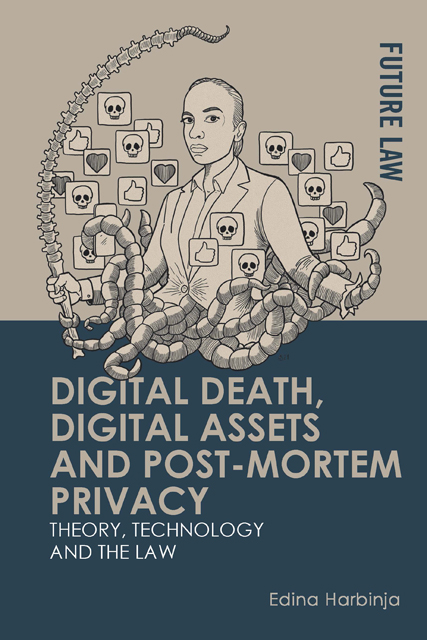Book contents
- Frontmatter
- Contents
- Acknowledgements
- Table of Cases
- Table of Legislation
- 1 Introduction
- 2 Theoretical Underpinnings: Property
- 3 Theoretical Underpinnings: Autonomy, Testamentary Freedom and Post-Mortem Privacy
- 4 Social Networks
- 5 Games, Virtual Worlds and Virtual Realities
- 6 Emails
- 7 Conclusion
- Bibliography
- Index
1 - Introduction
Published online by Cambridge University Press: 25 April 2023
- Frontmatter
- Contents
- Acknowledgements
- Table of Cases
- Table of Legislation
- 1 Introduction
- 2 Theoretical Underpinnings: Property
- 3 Theoretical Underpinnings: Autonomy, Testamentary Freedom and Post-Mortem Privacy
- 4 Social Networks
- 5 Games, Virtual Worlds and Virtual Realities
- 6 Emails
- 7 Conclusion
- Bibliography
- Index
Summary
It has been nearly twenty years since the issue of digital assets and death was first discussed in the media. Nevertheless, there is still little clarity in the law in most places. In 2005, a judgment was handed down in the US, In re Ellsworth, where the family of a US Marine, Justin Ellsworth, killed in Iraq, requested access to his emails stored in his Yahoo! account. Yahoo! refused, referring to its terms of service, which banned access to all third parties on death. Yahoo! claimed that the law prohibits it from disclosing deceased users’ personal communications without a court order. The family argued that as his heirs, they should be given access to Justin’s emails and the account, his sent and received emails, as his last words. Yahoo!, on the other hand, had a non-survivorship policy, and there was a risk that Ellsworth’s account could have been deleted for good. The judge allowed Yahoo! to enforce its privacy policy and did not order the transfer of the account credentials. Instead, he made an order requiring Yahoo! to enable access to the deceased’s account content by providing the family with a CD containing copies of the emails. The media reported that Yahoo! initially provided the emails received by Justin Ellsworth on a CD and, after the family complained again, allegedly subsequently sent paper copies of the emails.
In a more recent case in Germany, the parents of a fifteen-year-old girl who allegedly committed suicide wanted to access the account and private messages to understand why it happened. Facebook refused to grant access to the deceased girl’s Facebook account to her parents, arguing that its duty of confidentiality was owed to her and her contacts. The Court of Appeal in Berlin upheld Facebook’s decision, but the Federal Court of Justice overturned this, applying the law and the principle of universal succession (i.e. that heirs ‘step into the deceased’s shoes’ for all her rights and obligations).
In another US case, In re Scandalios, Ric Swezey died unexpectedly in 2017. His will did not explicitly authorise his husband, Nicholas Scandalios, to access his digital assets, including many family photos in his Apple account. Unsurprisingly, Apple iCloud’s terms and conditions stated that ‘any rights to your Apple ID or content within your account terminate upon your death’, unless required by law.
- Type
- Chapter
- Information
- Digital Death, Digital Assets and Post-Mortem PrivacyTheory, Technology and the Law, pp. 1 - 15Publisher: Edinburgh University PressPrint publication year: 2022

